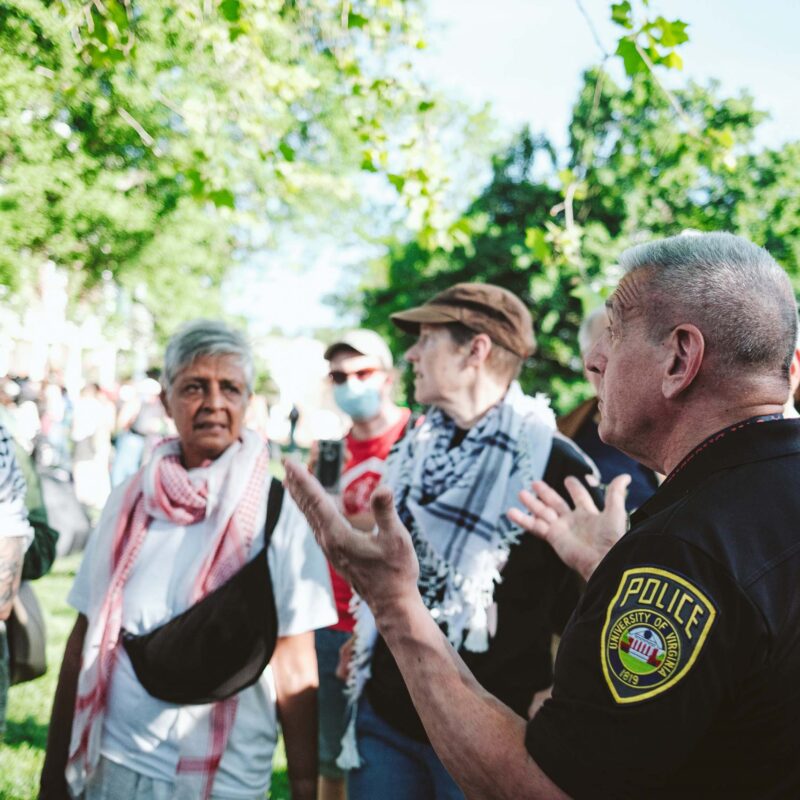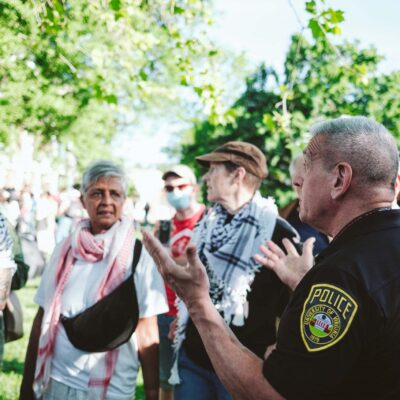The immediate years that followed World War II are universally known as the boom years, and as newly reunited couples everywhere became consumers, and spawned millions more, their insatiable appetite was met by an agricultural industry that was altering its practices. Rapidly, farms and farmers were being changed from diverse, multiproduct sources to one-dimensional producers. Americans were hungry, and they needed food—meat most of all.
 "Richard Bean is a crusader. I admire him for that," says Amy Childs of the farmer (pictured at the Charlottesville City Market.) Even so, the Nelson County Farmer’s Market manager will testify against him in court. |
The war had turned America into an assembly line machine, breathtaking in its output. For four years, it had provided soldiers with bullets, guns, tanks, planes—whatever they needed to beat back the Germans and Japanese. Now, though, we were triumphant and ready to revel in all that technology could bring to our home lives. Into that void leapt a food industry ready to comply and as it developed it became as streamlined. Instead of bullets there would be hamburgers.
Six decades later we are awash in meat. Go to a Wood Grill Buffet, for instance, and marvel at the piles of beef or chicken. Or if you’ve ever been to Vegas, then you’ve seen the signs proclaiming $2.99 prime rib. We are a country of carnivores and to keep our bellies full, cows, chickens, pigs, and the rest are funneled into what have come to be known as factory farms. Giant lots are separated into small pens where thousands of cows, for example, are pumped full of grain that is often mixed with their own remains. Turning them into cannibals has had some unforeseen results, one being Mad Cow disease. Then there are the myriad chickens confined in tiny cages, forced to live in their own excrement. The Avian Bird Flu was one byproduct of that.
 Trouble started this summer for Double H when their tenant farmers, pictured here on the left, were found to be selling uninspected pork at the Nelson County Farmer’s Market. |
These nasty side effects might have given a more reflective nation pause, but we just tweaked our processes, pumping the birds and beasts full of more antibiotics. Yet even as the industry marched forward, a tiny contingent was rising to challenge the corporate system, a sect that preached a back-to-basics lifestyle, with an emphasis on the food we consume and where we get it.
Here in Charlottesville, bastion of liberal affluent democracy, and in its outskirts, this rebellion has taken firm root. Travel to the City Market any Saturday, April through October, and you will see proof. Vegetables picked straight out of the ground are everywhere and sprinkled among them are a few providers of animal protein—free range chickens and their eggs, grass-fed beef, pork from pigs who live almost unrestrained lives.
 Unlike those on a factory farm, the Polyface hens roam freely, albeit behind an electric fence. Inside, one feasted on a recently captured snake. |
| Previous Double H coverage:
Nelson County for Double H Double H farmers busted for selling pork Previous local food coverage: Food fights The $5 tomato |
If you traveled to the Charlottesville market in recent weeks, you might have noticed an unusual sign posted at one vendor’s stall. "Government Bureaucracy Will Not Allow Double H to Process Its Own Pork Products," it read, and was placed there a week after Richard Bean and Jean Rinaldi were arrested for selling uninspected pork. On September 21, several police officers and two Virginia Department of Agriculture and Consumer Services (VDACS) enforcement officers raided their farm, which is also the home of a hundred hogs, a few hundred chickens, and an Armenian family that lives there and helps run it. Double H also grow a number of vegetables, and a few weeks after his arrest I rode with Bean as he made his deliveries to area restaurants in the Sunshine Van, a canary yellow oversized vehicle.
We started at Ivy Inn, dropping off some chickens and vegetables—squash and kale among them. Eventually, we made drops at Mas, Rev Soup, Feast and Maya. At each, Richard was warmly greeted and offered the same in return. "They all know me like their long lost…," he says, throwing his hands up, "whatever."
Spend any time with Richard and it’s easy to see his appeal. He has a gregarious nature, almost a John Wayne-like gravity, except he’s a farmer. He won’t shoot you, but slays you with a moisture-filled pork chop. When you buy from Richard, you are buying Richard, to a degree. He has raised the pig, cared over it, and in some cases killed it. The meat he has sliced himself, and personally handed to you. Of course, killing and processing the meat himself is what got him and his partner charged with seven misdemeanors and a felony for plying their meat at the Charlottesville City Market. (Four misdemeanors each were also served 10 days earlier in Nelson County.)
In Virginia as in the rest of the nation, it is illegal to sell cuts of meat if they have not been slaughtered and processed in a United States Department of Agriculture-certified facility. Largely out of frustration with a system that forces him to pay hundreds of dollars per pig, Richard had taken to slaughtering the hogs himself. In a way it made sense. Born in 1944, Richard is the son of a butcher. "I remember hanging onto his pants and going into these big meat houses and looking up at these huge carcasses with sawdust on the floor," he says.
After a stint in agricultural college and then the Peace Corps, Bean returned home to Massachusetts to work for his dad and eventually bought his father’s butchery when he retired in 1985. For the next 11 years, Bean ran the B&B market until chain grocery stores moved in and took away his business, he says. Crushed, Bean landed in the countryside of Virginia where he eventually settled in his current home in Wingina. Double H, short for the Home of Healthy Foods, was born.
So years later, when faced with a scheduling problem at a meat processing facility in Lynchburg, Bean took what seemed like a logical step. Why pay someone else to do what he—a lifelong butcher—could do just as well, even better?
"I was willing to take the chance for the money and the practicality," he says.
Regardless of his motivation, Bean now finds himself on the other side of state law and the industrial system of agriculture it has largely been set up to regulate. In Charlottesville, Bean and Rinaldi’s court date has been pushed back to the end of December. Their Nelson County court date has yet to be scheduled. "This will be tried in the court of public opinion," Bean says, and if so, he and his partner have been exonerated so far. Their arrest has made them popular emblems of a movement to restore food as a central part of life instead of a mere industrial afterthought.
It’s good to be the king
It’s good to be at the top of the animal food chain; very little that is tangible consumes our flesh. Meanwhile, we devour all others. "The average person eats 70 pounds of beef a year," says Joel Salatin over the caws of the hens parading around the people gathered on his Polyface Farm in Swoope, Virginia, for the second annual Legislators on the Farm Day. Two politicians—one aspiring, the other an incumbent—stand behind him, waiting their turns.
If there is one figure that has united the local food movement, perhaps even nationwide, it is Salatin. A third-generation farmer, he has become the focal point of a band of intensely devoted individuals who view as a fundamental right their ability to sell meat and vegetables they have raised directly to consumers. The fact that the government, the USDA specifically, must intervene in the middle of this process is an accepted but hardly tolerated evil.
While Salatin has been at this for decades, he is at his most visible now, thanks at least in part to a 2006 book called Omnivore’s Dilemma. Lovingly crafted by author Michael Pollan, the tome details a litany of abuses wrought by industrial agriculture while balancing those against the efforts of indigenous farmers like Salatin. It has become a Bible for the movement and by placing Salatin at its center made him its messiah. The fact that he is a graduate of Bob Jones University and a Bible-believing Christian lends an additional air of religious mystique. He is a food evangelist, and as such, it makes perfect sense that he starts this day with a prayer. "Our Lord, thank you for providing us such a gorgeous, beautiful afternoon to be here and enjoy the fellowship and enjoy being in your creative hands, and appreciating what you’ve put together for us," he says. "We especially thank you for the wonderful food before us, all the hands that have prepared it. We pray for appreciative and grateful hearts for every provision from your hand. In our savior’s name we pray, amen."
With that the small crowd around him opened their eyes and began to stir. "Don’t be bashful," Salatin commanded. "The food hasn’t been inspected." A few minutes later, I plop down on a hay bale and survey my paper plate piled high and wide with food, provided potluck-style by members of the Virginia Independent Consumer and Farmer’s Association (VICFA). I am most excited by a mound of barbecue chicken to the side of some sort of chili and garlic jelly. As I scoop the bird into my mouth I notice a hen headed past the corner of my bale. "I wonder if that chicken knows I’m eating chicken," I think. As a member of urban society, it is unusual to be confronted with the species I am dining on. The bird seems unfazed, though, and goes about picking through the various strands of dried grass protruding in his path. I turn back to my plate.
The food is delicious and thanks to the variety of contributors, there is a panoply of animal and plant species at my disposal. By the time Bean shows up with his smoked sausage, I am on a second round. "Oh, this is so good," Bean says as he slices the tube of meat and I have to agree. It is moist, spicy, and a little greasy as it slides across my tongue and palate. It is the third time in two days I have consumed something from his farm. A day earlier, I had lunch at Revolutionary Soup where I had accompanied him the week before as he dropped off chickens and butternut squash. Mixed with cider, the squash makes for a delicious soup, with a pureed texture but the body of fortifying stew. That night I dined at Mas and partook of Double H chicken, baked with cinnamon and coriander. Luscious.
Chicken again. I don’t mind. They are everywhere. Up on a hillside from where I am sitting, there are two of Salatin’s mobile chicken coops. To my left and two football fields away a larger pen sits, filled with red hens. Maybe an hour earlier I watched one of them run ahead of a pack, a corn snake dangling from her beak. She danced a porkpie strut, and the others squawked, chasing. Finally, she stopped and ate. The others attacked. Killing and eating a snake had to be the pinnacle of this chicken’s life. Although an electric fence sneered a few feet away, she didn’t seem to mind.
 Elizabeth Van Deventer of Davis Creek Farm wishes the state agricultural system was more applicable to small farms, "but it feels like it’s stacked against producing this way," she says. |
Less than 10 miles from those birds sits a Cargill "factory farm" where hundreds of chickens and turkeys live almost every single day of their short lives in closed confinement. With countless farms nationwide, Cargill is one of the largest meat operations in the world, having posted first quarter earnings of $917 million for the 2008 fiscal year. On October 6, they also recalled approximately 844,812 pounds of frozen ground beef patties for possible E. coli contamination. When I tried to call someone at Cargill for an explanation I got a phone message that referred me to their website. There, I found this: "The recall is based on an investigation by the Minnesota Department of Health and the Minnesota Department of Agriculture…. Minnesota officials had investigated four cases of E. coli O157:H7 infection involving individuals who had consumed American Chef’s Selection Angus Beef Patties purchased at Sam’s Club stores in the state." As the bottom of the webpage informed me, "E. coli O157:H7 is a potentially deadly bacterium that can cause bloody diarrhea and dehydration." At press time, Cargill announced that it will recall an additional million pounds of ground beef.
These recalls, like a similar one at Topps Meat Company in September that involved almost 22 million pounds of meat, highlight the dangers that result from a massive food production system. They also seem to bear out the words of farmer Elizabeth Van Deventer, who responded to an October 2 article in this paper on the Double H arrest with a passionate letter to the editor that began with this declaration: "[T]he arrest of Richard Bean and Jean Rinaldi has nothing to do with food safety and everything to do with culture and politics." She continued:
"The question all consumers should be asking is this: Why is it legal for corporate factory farms to sell meat from livestock that have been fed arsenic as an appetite stimulant, the remains of other animals, urea from natural gas, chicken feathers, hormones and daily doses of antibiotics to keep the animals from dying from their sick surroundings? This factory farmed meat, where animals are packed together by the tens of thousands in disease-ridden environments, is given the stamp of approval by the USDA to appease their powerful corporate clients. Double H’s pigs, by contrast, live their lives roaming outside in fresh air, they are given natural, locally produced grains, and are processed by Richard himself, a lifelong butcher.
"We are fooled by the ‘assurance’ of a USDA inspector when the meat itself is unhealthy to eat in the first place. E. coli contamination and Mad Cow disease are the result of intensive, confined cattle practices and no USDA inspection could prevent that. It’s time to change the laws. If I want to buy healthy pork from Double H and not from a corporate farm’s mistreated, unhealthy, factory pigs, that should be my right."
Thirty minutes south of Charlottesville in Nelson County, Van Deventer operates Davis Creek Farm. Most mornings she can be found out in the pasture attending to her mobile chicken coops. On this particular one she is waiting for the sun to come up. Otherwise, the broiler hens she raises will remain asleep and refuse to budge. "Good morning, girls," she says, greeting the broilers. They cluck and chirp. Moving the coops up and down the pasture prevents the chickens from living in the degradation a normal industry chicken endures. "You look in there and see how much they put down in one day and then imagine that for nine weeks," she says. "I can’t even imagine that." She is right, the smell is quite acrid, and I can’t even conceive of a three-month buildup of their manure.
Van Deventer has 400 birds split among the two coops, and will altogether produce 2,000 chickens for sale during a season that starts in the spring and is just about to end. Forty head of grass-fed cattle are sprinkled on a neighboring hillside. "It feels like [the system] is stacked against producing this way," she says. As she pours grain for her birds, there is obviously something about the way that Bean was arrested that still gnaws at her. "The whole case with SWAT teams going out and arresting someone like him," she says, "where are the SWAT teams at Gwaltney sausage and Purdue?"
Good rules and the guts to enforce them
"I’ve been around tall blustery people all my life and while I’m short and middle-aged they don’t scare me," says Amy Childs, laughing pleasantly as she says this. On July 21 of this year, the diminutive manager of the Nelson County Farmer’s Market walked over to the Double H table and asked to see inside their meat cooler. That’s when she discovered they were selling uninspected pork. The following week, a VDACS enforcement officer visited the market and approached her. "He asked me if I had seen them trying to sale uninspected meat," she says. "This is why I’m on Richard Bean’s dartboard."
For Childs, the matter is simple. Bean sold uninspected meat that violates the market’s rules. "We have good rules and the guts to enforce them," she says, reading from a letter she has crafted to area publications but has not actually mailed. She continued to read from it. "When a vendor comes to Nellysford and signs our market’s producer certificate, they make certain promises. One is to follow the rules of our particular market. The other is to comply with state laws governing their product. I see this as the essence of the case."
She pauses, taking a break from her letter. "I understand that their battle is that they want to grow stuff on their farm and sell it," she says. "If they want to change that law I personally support that. Change the law but when you come off the farm and to the market, that’s different."
 Joel Salatin and Richard Bean are two of the farmers advocating a change in state legislation so they can sell directly to consumers. |
Rare among her peers for her stand against Bean, Childs is joined by VDACS which, to be fair, is simply enforcing the current law. "There will always be people on one end that think government can and should do more, and at the other end those who think government should do less," says Elaine Lidholm, a VDACS spokesperson. "I’m not sure you’re ever going to make those groups happy but we’re not in the business of doing that. Our business is to protect the food supply, protect public health and safety and enforce the law. And anybody who’s not happy with the law then needs to talk to their delegates, senators, congressman and all that to try to get the law changed."
Van Deventer, Salatin, Bean and the rest of VICFA take the position that the direct exchange between a producer and a consumer should go unregulated. To that extent, they have proposed a Waiver of Liability that a consumer could sign before purchasing uninspected meat. "There needs to be some way to transact neighborhood commerce across the back fence that does not involve a bureaucrat’s intervention," Salatin says. We are sitting in a small room off to the side of an auditorium in Afton where he will later speak.
"I don’t see how any court could tell me I have the freedom to choose how to worship, how to speak, to own a gun but I don’t have the right to choose what to feed [myself]," he says. "What good is it to have the freedom to preach, pray and shoot if I can’t fuel my body the way I want to? It’s such a visceral fundamental right and a moral high ground to espouse. It just seems like it could carry the day in any reasonable debate."
According to Salatin, the locally grown food movement is at a critical point. "Right now we’re at Wounded Knee," he says, repeating words similar to ones he has put down in his recently published book, Everything I Want to Do Is Illegal. "What we’ve got is a heritage-embedded indigenous food system that is struggling, it’s almost snuffed out, and what we need is to get a whole bunch more Indians together so we can’t be snuffed out."
If there is anyone who is not in danger of being snuffed out it would seem to be Salatin. One recent Sunday, I found myself in line at Chipotle Mexican Grill in front of a sign that read: "The naturally raised pork we are serving RIGHT NOW is from locally owned Polyface Farms." As it turns out, one of Salatin’s converts is Steve Ells, founder and CEO of Chipotle, who discovered the farmer through Omnivore’s Dilemma. At the same time as he was reading that book his operations director, Phil Petrilli, was participating in a metropolitan buyer’s club in Washington, D.C. Under this, a bevy of locally grown products, including Salatin’s, are delivered to a pre-organized city site where various members can receive items straight from the farm. For the Chipotle folks, who already put a stress on serving meat that has no added hormones or antibiotics, Salatin’s operation seemed ideal.
"It’s incredible how the pork tastes," Petrilli says, marveling at the immediacy of it all. "I can go down and see these animals, two weeks later they are slaughtered and three days later being marinated so that you can go over and have a Carnitas burrito four days later."
For the last few months, Salatin has been delivering between 100 and 200 pounds of pork every two weeks to the Charlottesville Chipotle, and that Thursday I stood with Chef Consultant Joel Holland and watched as a kitchen attendant tore open plastic bags of Salatin’s pork, dumped it into a large silver container and began to salt it. "Joel’s pork is really good," Holland says. As he explains, the first time they carried Salatin’s meat the servers delighted at their first taste. "The flavor is really good, it’s just much more alive, almost more fresh tasting."
 Joel Holland, who routinely flies in from Denver to help supervise the preparation of Polyface pork at Chipotle, is getting ready to try the local farming prototype in his area. |
Creating a partnership between a local farmer and a restaurant that is part of a national chain has required flexibility on both sides, but so far so good. Holland will soon be returning to his home in the Denver area to try the prototype there. "It’s a little baby project but it’s going well and I’m excited," he says.
"The industrial food sector views food as an inanimate protoplasmic structure," Salatin says. We are back in Afton. "The only question they ask is can we grow it faster, cheaper and bigger. That’s all that matters."
"We’ve pushed that industrial paradigm," he says, concluding. "What we represent to those lords and nobles ensconced in their castles—the Wal-Marts, Cargills, Monsantos —is gun powder. They’re scared to death of our ability to make an end run and to start opting out in a large scale. We’re making enough stir and in-roads that the conventional paradigm is pushing back."





